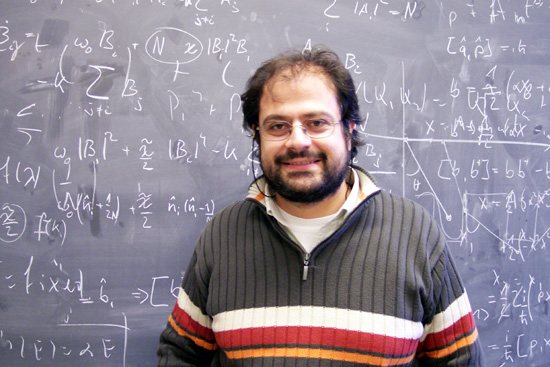Kottos to Receive International Nonlinear Physics Award
 |
| Tsampikos Kottos, assistant professor of physics, says his Wesleyan colleagues have encouraged him to pursue his research. |
| Posted 10/02/07 |
| Tsampikos Kottos, assistant professor of physics, is the recipient of a major international award for his “many outstanding contributions in the field of nonlinear physics and quantum chaos.
In March 2008, he will be presented with the Stephanos Pnevmatikos International Award for Research in Nonlinear Phenomena, which is given to an outstanding young researcher in the fields of nonlinear physics, mathematical physics and nonlinear disordered systems. The award, worth $10,000, is presented to only one researcher or scientist every two years. Kottos is the eight recipient of the award, and the only researcher from a liberal arts college. This speaks highly of Wesleyan, he says. I was always viewing the success of these people not only as a result of their personal achievement, but also as a result of their scientific environment, support of their colleagues. Research is not a one person’s achievement, Kottos says. It involves discussions, alternative viewpoints, composition of ideas and above all, a supporting academic environment. Wesleyan University, offering me the position of assistant professor, showed its recognition to my scientific work and encouraged me to pursue my research line further. Kottos studies complicated moving forms, from electrons and bosons in “chaotic” confinements, to arrays of coupled “non-linear” pendula. Among his most important contributions was his simplified method of modeling electron transport from complex, or chaotic, confinements. Pretty often the mathematical equations that describe these systems become very ugly, and the systems are so complex that you cannot even write, or dare to write, the mathematical equations that describe them, he says. In his Quantum Mechanics class, Kottos teaches students how to use quantum graphs, a simplified model which imitate the behavior of complex nuclei, molecules, and solid-state devices. Last year, Kottos introduced quantum graphs in a new area of research called atomtronics. His goal is to propose atom-based devices that will be extremely accurate, highly controllable, and have the ability to process quantum information in precision measurements. For these efforts, among others, he was nominated for the nonlinear phenomena research award by Professor Theo Geisel, director of the Max-Planck Institute for Dynamics and Self-Organization in Goettingen-Germany. The Max-Planck Institutes are the leading research institutions in Germany, and several of their directors are Nobel-prize-caliber scientists. In this respect, the nomination itself by Professor Geisel is a great honor, Kottos says. His group, consisting of graduate students Moritz Hiller and Josh Bodyfelt; and undergraduates Gim Seng Ng 08; Rangga Budoyo 08; Katrina Smith-Mannschott 08, Jiayi Zhang 09; and Carl West 11 have already made a significant presence in the scientific community. Together, they have produced more than 10 publications and participated in 15 invited talks at international conferences, colloquia and seminars during the past two years. I am pretty confident that we will move forward with the same excitement, achieving new breakthroughs in the future, he says. Kottos will receive the award during the American Physical Society meeting. The award will be presented by the committee member Prof. David Campbell, provost of Boston University. The award is established by the Foundation of Research and Technology Hellas, which is the largest research organization in Greece, in memory of the late Professor Stephanos Pnevmatikos. Candidates must be outstanding researchers in the fields mentioned above and must be under 40 years old. Kottos plans to use the monetary award for personal reasons; however his youngest daughter, Eva-Maria, 2, was promised a slice of the prize. When I learned that I received the award, I called my wife to share my excitement, and she asked my daughters, Did you hear what daddy won? Eva replied Cake? Wooooo! so weve figured that $10,000 is equal to approximately 10 years of cake paradise for our daughter, Kottos says. |
| By Olivia Drake, Wesleyan Connection editor |

